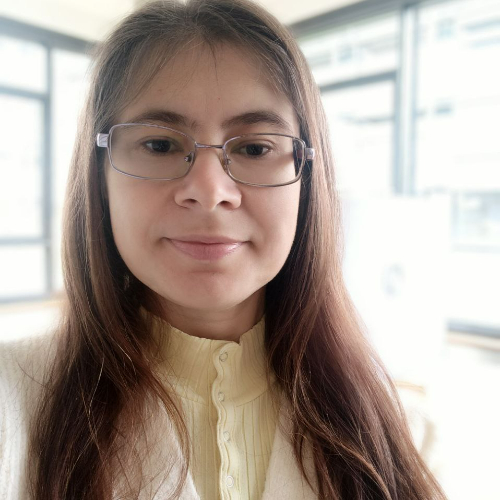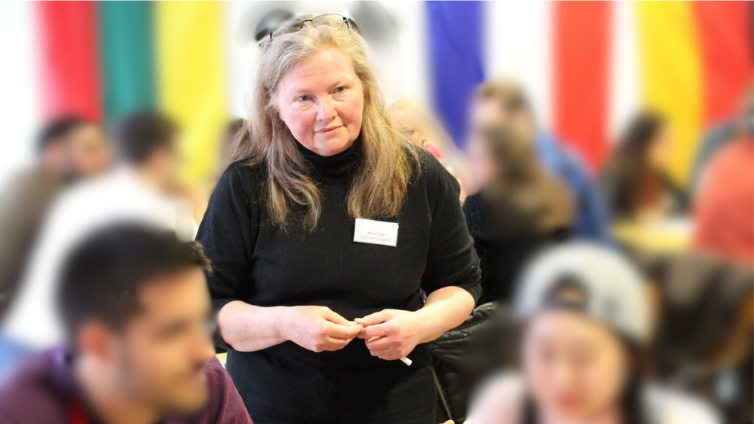Open webinars 2024
Open webinars 2024
Curious about current issues, new tools and methods in IT education?
Join these open seminars for the teaching staff!
Centre for Excellent IT Education, Excited, aims at bringing Norway in the forefront of innovative IT education and making IT an increasingly more attractive study choice for young people. These webinars aim at creating arenas for discussions and reflection among the teaching staff. Each webinar includes a presentation and a Q&A session.
Webinar: "Sustainability in software engineering education" with Dr. Shola Oyedeji
Webinar: "Sustainability in software engineering education" with Dr. Shola Oyedeji
Sustainability in software engineering education
Curious about current issues, new tools and methods in IT education?
Join this open seminar from the SFU Excited Autumn 2024 seminar series for the teaching staff!

Title: Sustainability in software engineering education
Date and time: Friday, 13 December, 09:30-10:15 CET
Place: Teams (all registered participants will receive a link prior to the seminar)
Target group: Teachers in computing in higher education
Language: English
Abstract: The ongoing information age has led to the proliferation of software products and services to an extent that barely any facet of human activity is left untouched. Consequently, the footprint of software is on the rise, and the pace of this rise is escalating with each iteration of software – for example, the advent and widespread adoption of LLMs further magnifies the emissions associated with clouds, both data as well as computing. In the face of this reality and the stressed planetary boundaries, due thought and effort must be put in to ensure that software is built, used, and phased out in the most sustainable manner possible.
While there is adequate emphasis and effort in teaching technological skills, there is barely any visible effort in teaching the skills and competencies needed to do software engineering in a sustainable manner, keeping the earth’s ecosystems (the planetary boundaries) in mind. This presentation and discourse are about our experience at LUT University, focusing on integrating the teaching of sustainability skills and competencies in mainstream software engineering education, presenting the SE4GD master’s program and a sub-set of the sustainability-focused software engineering course(s) in SE4GD.
About the speaker: Dr. Shola Oyedeji is a Post-doctoral Researcher in the Software Engineering Department at LUT University. He specializes in software product sustainability design and impact assessment, with a research focus on raising awareness, developing measurement frameworks, and sustainability assessment of software products and services. Dr. Oyedeji supervises master's and doctoral students on various topics related to sustainability in software engineering and is actively involved in teaching courses addressing sustainability issues in software engineering. As the deputy coordinator of the Software Engineers for Green Deal (SE4GD) master’s program, he plays a pivotal role in training future software developers to embrace sustainability as a core principle. He is also a member of the Sustainability Design Alliance, an initiative committed to advancing knowledge and fostering awareness about sustainable practices in software design.
Workshop: “Beyond Digital Savvy: Illuminating the Path from Digital Proficiency to AI Literacy” with Angela Fessl
Workshop: “Beyond Digital Savvy: Illuminating the Path from Digital Proficiency to AI Literacy” with Angela Fessl
SFU Excited seminar “Beyond Digital Savvy: Illuminating the Path from Digital Proficiency to AI Literacy”

Language: English
Target group: Teachers in computing in higher education
Place: NTNU Gløshaugen, IT building, room 242 and Teams
About the speaker: Angela Fessl received the MSc degree for Computer science in the field of Telematik, and her PhD (with distinction) degree in informatics from the Graz University of Technology, Austria. Angela works as scientific deputy area manager of the area Digital Transformation Design at the Know-Center and as senior researcher at the Institute of Interactive Systems and Design Science, Graz University of Technology. Her research focus is on (workplace) learning and educational technologies (with focus on reflective learning), digital transformation and socio-technical design (including co-creation, co-design, and participatory design). This is aligned with the topics of digital competencies and skills as well as AI literacy in the domain of certification and auditing.
Abstract: In an era characterized by rapid technological advancement, digital proficiency has become a fundamental skill for individuals and organizations alike. The more we intricate the landscape of digital technologies, it becomes increasingly evident that mere proficiency is no longer sufficient. Especially the rise of artificial intelligence (AI) introduces a new dimension to digital literacy, necessitating a shift from digital savvy to AI literacy.
In my presentation, I will explore the transition from digital proficiency to AI literacy, elucidating the essential competencies to navigate the evolving digital ecosystem effectively. While digital proficiency especially in the educational context encompasses skills such as basic computer literacy, media literacy etc., AI literacy transcends these foundational abilities and entails a deep understanding of AI concepts, algorithms, and their ethical implications (trustworthy AI), as well as the ability to critically evaluate and interpret AI-driven outputs.
I will present insights and results from several research projects such as DIGIVID (Erasmus+ project - 2021 – 2023) and EMERALD (HORIZON-CL3-2022-CS-01 – 2023 - 2026), and company-related projects dealing with the application of AI in industries and the certification domain.
By illuminating the path from digital savvy to AI literacy, I will draw the bow from basic digital literacy relevant in teaching and learning to AI Literacy necessary for individuals and organizations in the context of certification in which digital proficiency alone is no longer sufficient.
Workshop: “Using Microsoft Copilot in the work of IT educators” with Kateryna Osadcha
Workshop: “Using Microsoft Copilot in the work of IT educators” with Kateryna Osadcha

When: Friday 10 May 2024, 13:00 – 14:30 CET
Where: NTNU Gløshaugen, IT building, room 454 and Teams (all registered participants will receive a link prior to the workshop)
Target audience: Teachers in computing in higher education
Language: English
Image: The educator uses AI tools in the class, generated by Night Café
Program:
13:00 - 13:10 Survey 1
13:10 - 13:25 Brief presentation of the Microsoft Copilot and “Guide to using Microsoft Copilot Chat”
13:25 - 13:45 Individual work with prompts - part 1
13:45 - 14:00 Coffee break (waffles will be served)
14:00 - 14:20 Individual work with prompts - part 2
14:20 - 14:30 Survey 2
The workshop is part of the research conducted by Excited for the presentation at the 36th Norwegian ICT Conference for Research and Education, NIKT 2024 in Bergen. During the workshop you will be asked to complete two short surveys, which will contribute to this research.

About speaker: Kateryna Osadcha is a researcher at the Norwegian University of Science and Technology, and professor, DSc in professional education from the Classic Private University, Ukraine. Since 2023, she has been working at the SFU Excited under the Scholars at Risk program on the topic "Application of AI technology in the professional work of IT-educators". One of the results of her work is a “Guide to using Microsoft Copilot Chat”.
Webinar: "Confrontation and provocation to promote sustainability skills" with Anne Fox
Webinar: "Confrontation and provocation to promote sustainability skills" with Anne Fox

Green Pedagogy - A structured approach to lesson planning
Date and time: Friday, 5 April, 13:00-14:00 CET
Language: English
Place: Zoom
Abstract: I will be taking you through the main philosophy and steps behind the Austrian pedagogical approach to sustainability called Green Pedagogy, not because I am the expert in Green Pedagogy (Grüne Pädagogik) but because I was a partner in an Erasmus+ project in 2016 which had Green Pedagogy at its heart. One of my aims with this chapter was to get the message out beyond the German speaking world. Many of its aspects may be familiar but there are some key steps which change the common trajectory of much Education for Sustainable Development. One of the challenges I will be discussing will be about agreeing on terms.
About the speaker: Anne Fox is an educational consultant based in Denmark focusing on online teacher training, intercultural communication and coaching. Since 2013 she has been working with staff from the Department of Computer Science at NTNU on various EU Erasmus+ projects as well as workshops on learning and assessment for the Masters, Customized Corporate E-Learning.
Webinar: "Ways of thinking in informatics" with Peter Purgathofer
Webinar: "Ways of thinking in informatics" with Peter Purgathofer

Date and time: Fri, 16 February 2024, 13:00-14:00 CET
Language: English
Place: Zoom
The target audience are educators in Computer Science at NTNU and Nord University.
About the speaker: Peter Purgathofer is Associated Professor at the TU Wien, Informatics Faculty. He is founding member of the HCI Research Division and Coordinator of the Media and Human-Centered Computing Master Program. His research focusses on the role of design thinking in informatics and on ethical and societal challenges of information & communication technologies.
Abstract: In 2018, a novel compulsory course was introduced to the first semester of informatics bachelor programs. Planned as a europeanized version of the new CS intro courses like »beauty and joy of computer science«, it came out as an academic celebration of the interdisciplinarity of informatics, with the goal to give students guidance and direction in their further studies and beyond. The talk will introduce the concept and our approach, our experiences so far, and the challenges we face.
Recording from the webinar:






